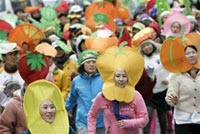|
|

|
|
South Korean activists clad in masks symbolizing fruits and vegetables parade to promote vegetarian food in Seoul, South Korea, Sunday, February 22, 2009. [Agencies]
|
In a new study, 186 four-year-olds were given regular carrots and, on other lunch days, they were given the same vegetables renamed X-ray Vision Carrots. On the latter days, they ate nearly twice as many.
The study suggests the influence of these names might persist.
Children continued to eat about 50 percent more carrots even on the days when they were no longer labeled as anything special.
The research, funded by the Robert Wood Johnson Foundation, was presented at the annual meeting of the School Nutrition Association in Washington, DC.
"Cool names can make for cool foods," says lead author Brian Wansink of Cornell University. "Whether it be 'power peas' or 'dinosaur broccoli trees,' giving a food a fun name makes kids think it will be more fun to eat. And it seems to keep working - even the next day," Wansink said.
Similar results have been found with adults. A restaurant study showed that when the Seafood Filet was changed to Succulent Italian Seafood Filet, sales increased 28 percent and taste rating increased by 12 percent. "Same food, but different expectations, and a different experience," said Wansink, author of "Mindless Eating: Why We Eat More Than We Think."
The veggie study was conducted in pre-schools, but the researchers believe the same naming tricks can work with children at home.
"I've been using this with my kids," said researcher Collin Payne, "Whatever sparks their imagination seems to spark their appetite."
點(diǎn)擊查看更多雙語(yǔ)新聞
(Agencies)
|
在一項(xiàng)最新研究中,研究人員讓186名四歲的兒童吃“普通”胡蘿卜,并在另外幾天午餐時(shí)給他們吃同樣的胡蘿卜,但把名字改成了“X光透視眼胡蘿卜”,結(jié)果發(fā)現(xiàn),孩子們?cè)谶@幾天所食用的胡蘿卜量為之前的近兩倍。
研究表明,這些“酷名”的影響可能會(huì)持續(xù)。
即便之后沒再給胡蘿卜起什么特別的名字,孩子所攝入的胡蘿卜量仍然比以往多約50%。
這項(xiàng)研究由羅伯特?伍德?約翰森基金會(huì)資助,研究結(jié)果在華盛頓召開的“學(xué)校營(yíng)養(yǎng)協(xié)會(huì)”的年度會(huì)議上公布。
研究主要負(fù)責(zé)人、康奈爾大學(xué)的布萊恩?萬(wàn)辛克說(shuō):“名字酷,東西似乎也就酷。所以無(wú)論是‘大力豌豆’還是“恐龍花椰菜”,給食物起一個(gè)有趣的名字能讓孩子們覺得這些東西吃起來(lái)會(huì)更有意思。而且這種影響會(huì)持續(xù)——即便到了第二天也如此。”
大人們也具有這種“情結(jié)”。一項(xiàng)餐館調(diào)查發(fā)現(xiàn),將“海魚”改名為“意大利多汁海魚”后,其銷量上升了28%,口味評(píng)級(jí)上升了12%。《食無(wú)止境:為什么我吃得比認(rèn)為的多》一書的作者萬(wàn)辛克說(shuō):“其實(shí)是同樣的東西,但期望值和體驗(yàn)都不同。”
這項(xiàng)有關(guān)蔬菜的研究在幼兒園開展,但研究人員認(rèn)為“酷名效應(yīng)”同樣適用于不上幼兒園的孩子。
研究人員科林?佩恩說(shuō):“我就對(duì)我的孩子采取這種方法。能激發(fā)他們想象力的東西似乎也能激發(fā)他們的胃口。”
相關(guān)閱讀:
母乳喂養(yǎng) 益智兒童
英國(guó)兒童看世界:快樂(lè)最重要
(英語(yǔ)點(diǎn)津姍姍編輯)
|